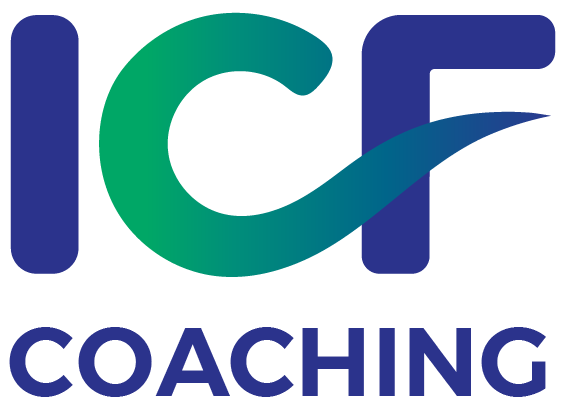Navigating the World of Coaching: A Comprehensive Guide to ICF Courses and Other Coaching Courses
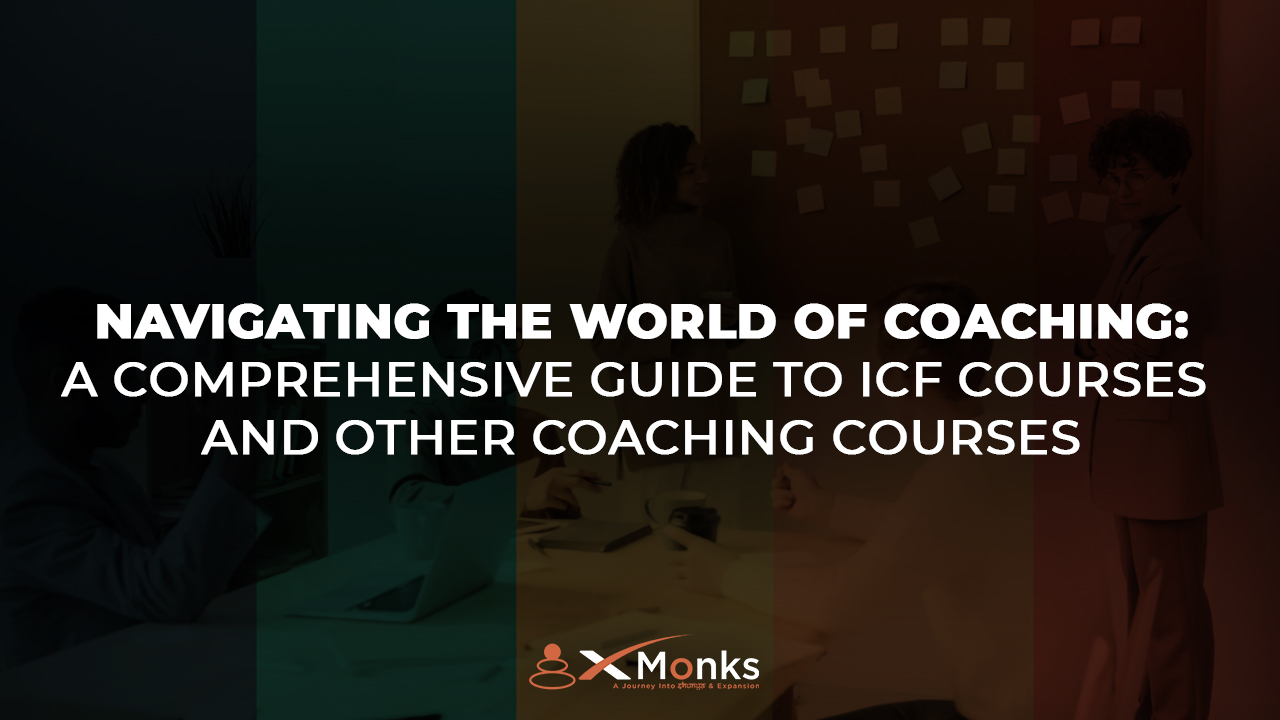
The field of coaching has gained significant traction in recent years, with more professionals seeking to enhance their skills and credentials through specialised training. Among the myriad options available, ICF courses and various coaching courses stand out as pivotal for those aiming to excel in the industry. This blog explores the essentials of ICF and coaching courses, their benefits, and how they can set you on the path to a successful coaching career.
Understanding Coaching Courses
Coaching has become a vital component in personal and professional development. Whether you’re seeking to enhance your leadership skills, improve team dynamics, or focus on personal growth, coaching courses offer valuable tools and strategies. But what exactly do these ICF courses and other courses entail? Let’s dive into the world of coaching courses to understand their significance.
What Are Coaching Courses?
Coaching courses are structured programs designed to teach individuals the art and science of coaching. These coaching courses cover various aspects, including communication techniques, goal-setting strategies, motivational methods, and more. They cater to different levels of expertise, from beginners to seasoned professionals.
Types of Coaching Courses
General Coaching Courses: These provide a comprehensive overview of coaching principles and practices. They are ideal for those new to the field and looking to gain a broad understanding of coaching.
Specialised Coaching Courses: These focus on specific areas such as executive coaching, life coaching, or health coaching. They are tailored for individuals who wish to concentrate on a particular niche.
Certification Programs: Many coaching courses offer certification upon completion. This certification can enhance your credibility and open doors to more advanced coaching opportunities.
Types of Specialised Coaching Courses
There are numerous types of coaching courses (the primary ones being the ICF courses) available, each focusing on a specific area. These include:
Life Coaching Courses: Focused on personal development, these courses help individuals achieve personal goals and overcome obstacles.
Executive Coaching Courses: Aimed at professionals in leadership roles, these courses focus on enhancing leadership qualities, decision-making skills, and team management.
Health and Wellness Coaching Courses: These courses focus on promoting healthy lifestyle choices, offering guidance on nutrition, exercise, and mental well-being.
Key Components of Coaching Courses
Coaching courses typically include several core components:
Theory and Principles of Coaching: This includes understanding the fundamental concepts of coaching, such as active listening, empathy, and goal setting.
Practical Application: Many courses offer hands-on practice, allowing participants to apply the techniques they learn in real-life scenarios.
Assessment and Feedback: Continuous assessment and feedback are integral parts of these courses, helping individuals to refine their coaching skills.
Who Can Benefit from Coaching Courses?
Coaching courses are not just for aspiring coaches. They are beneficial for anyone looking to improve their communication skills, enhance personal or professional growth, or assist others in achieving their goals. Especially for working professionals, the importance of ICF courses cannot be understated. This category includes managers, educators, HR professionals, and more.
The Impact of Coaching Courses
The impact of coaching courses can be profound. Participants often experience increased confidence, better decision-making skills, and enhanced personal and professional relationships. These courses can lead to significant personal growth and career advancement.
Coaching courses offer a pathway to personal and professional development, equipping individuals with the tools needed to achieve success in various areas of life. Whether you’re looking to become a professional coach or simply want to improve your own skills, understanding the various aspects of coaching courses is essential.
The Role of ICF in Coaching Education
In the realm of coaching, the International Coaching Federation (ICF) stands as a beacon of excellence. As one of the most recognised organisations in the coaching industry, ICF plays a crucial role in setting standards, providing accreditation, and shaping the future of coaching education. Let’s explore the significant role ICF plays in the world of coaching. On the way, let us also look at the benefits of ICF courses.
What is the ICF?
The International Coaching Federation (ICF) is a global organisation dedicated to advancing the coaching profession. Established in 1995, the ICF sets the gold standard for professional coaching, offering accreditation for coaching programs and certification for coaches.
ICF’s Mission and Vision
ICF’s mission is to lead the global advancement of the coaching profession. The organisation aims to ensure that coaching is an integral part of a thriving society, with coaching being recognised as a key contributor to personal and professional development worldwide.
ICF Accreditation
One of the most critical roles of the ICF is accrediting coaching programs. The ICF Accreditation is a mark of quality, ensuring that coaching programs meet the highest standards in the industry. This accreditation is essential for coaching programs that wish to be recognised globally.
Why Choose ICF Courses?
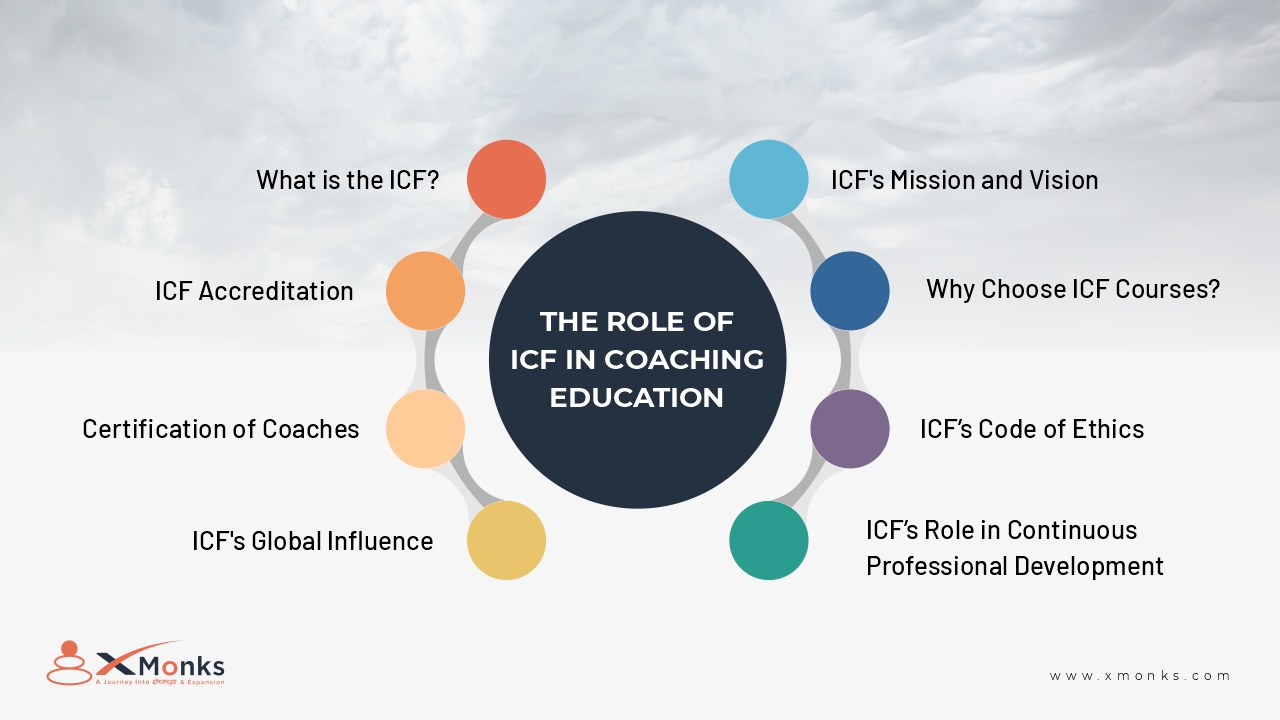
Global Recognition: ICF accreditation is widely respected in the coaching industry. Completing an ICF course can significantly boost your credibility and employability.
Comprehensive Curriculum: ICF courses offer a robust curriculum that covers core coaching competencies, including ethical practices, client relationships, and goal setting.
Professional Development: ICF courses often include mentorship and practical coaching experience, providing invaluable hands-on training and professional growth.
Certification of Coaches
The ICF offers certification for individual coaches, which is highly regarded in the coaching industry. The certifications are available at three levels:
- Associate Certified Coach (ACC)
- Professional Certified Coach (PCC)
- Master Certified Coach (MCC)
These certifications ensure that coaches meet stringent educational and experiential requirements, maintaining the integrity and professionalism of the coaching industry.
ICF’s Code of Ethics
ICF’s Code of Ethics is a cornerstone of its commitment to excellence. It outlines the ethical guidelines and standards for professional conduct, ensuring that all ICF-accredited coaches adhere to the highest ethical standards.
ICF’s Global Influence
With a presence in over 140 countries, the ICF has a significant global influence. It provides a platform for coaches worldwide to connect, share knowledge, and continue their professional development.
ICF’s Role in Continuous Professional Development
The ICF emphasises the importance of continuous professional development (CPD). It offers various resources, including workshops, webinars, and conferences, to help coaches stay updated with the latest trends and practices in the industry. The continuous updation of the content of ICF courses makes sure that participants are in touch with the world of coaching, in real time.
The ICF plays a pivotal role in the coaching industry, ensuring that coaching professionals adhere to the highest standards of practice. Through its accreditation, certification, and ethical guidelines, the ICF continues to elevate the coaching profession globally.
Key Benefits of Enrolling in ICF Courses
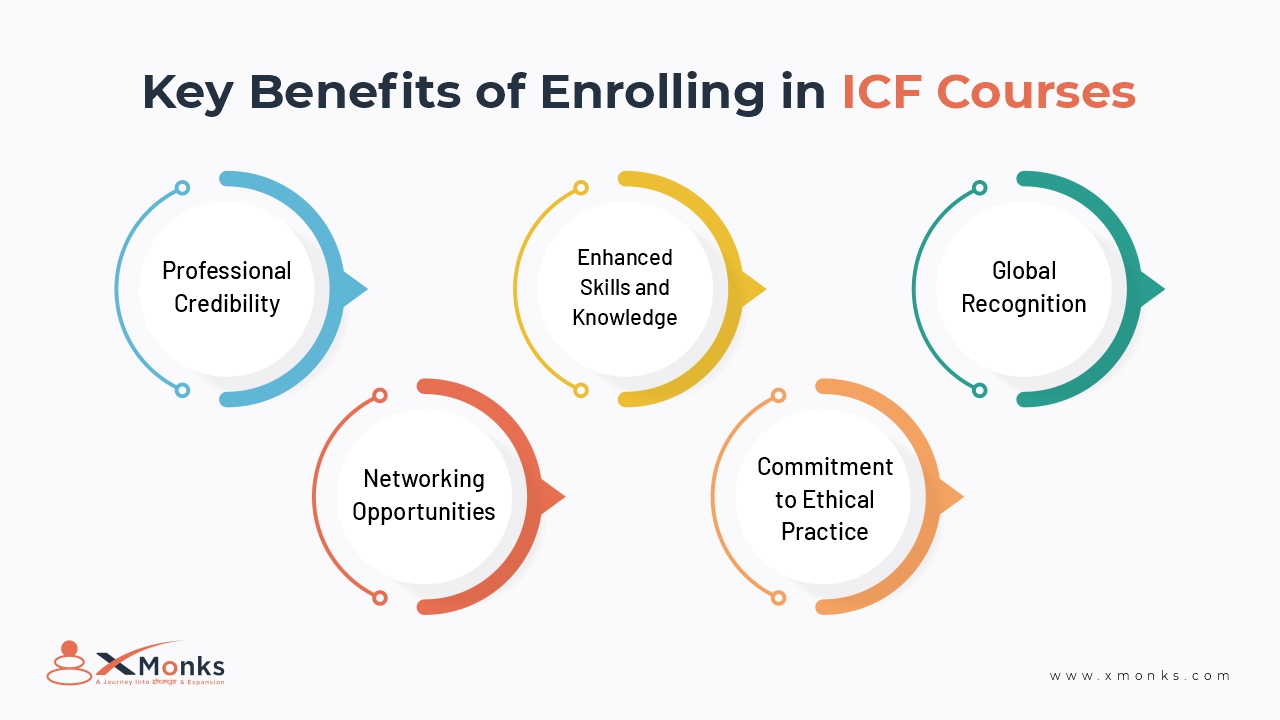
Enrolling in International Coaching Federation (ICF) courses offers a range of benefits that can significantly enhance your coaching career. The ICF is a globally recognised organisation that sets the standard for professional coaching, ensuring that its courses are both rigorous and comprehensive.
Professional Credibility
ICF accreditation is a mark of quality and professionalism in the coaching industry. Completing ICF courses signals to potential clients and employers that you have met high standards in coaching education and ethics. This credibility can open doors to more opportunities and higher earning potential.
Enhanced Skills and Knowledge
ICF courses are designed to provide in-depth training that covers essential coaching competencies, such as effective communication, goal-setting, and ethical practice. The curriculum is grounded in research and best practices, ensuring that you gain the knowledge and skills needed to excel as a coach.
Global Recognition
With ICF’s international reputation, your certification will be recognised and respected worldwide. This global recognition can be particularly beneficial if you plan to work with clients or organisations across different countries.
Networking Opportunities
Enrolling in ICF courses connects you with a network of like-minded professionals. The ICF community is vast and offers numerous opportunities for networking, mentorship, and continuous learning. This can help you grow your practice and stay updated with industry trends.
Commitment to Ethical Practice
The ICF places a strong emphasis on ethics, and their courses include a thorough understanding of the ICF Code of Ethics. This commitment to ethical practice ensures that you are equipped to handle complex coaching situations with integrity.
In summary, enrolling in ICF courses provides you with the tools, credibility, and network necessary to succeed and thrive in the coaching industry.
Comparing ICF Courses with Other Coaching Courses
When it comes to selecting a coaching course, the options can be overwhelming. Among the numerous choices available, International Coaching Federation (ICF) courses are often regarded as the gold standard. But how do ICF courses compare with other coaching programs? Let’s explore the differences to help you make an informed decision.
Accreditation and Global Recognition
ICF courses are widely recognised for their rigorous accreditation process. The ICF is a globally respected organisation, and its accreditation is a hallmark of quality in the coaching industry. Completing an ICF-accredited course ensures that you meet the highest standards in coaching education. In contrast, many other coaching programs may not have such stringent accreditation, and their certification might not hold the same weight on a global scale.
Curriculum and Competency Focus
The curriculum of ICF courses is designed to cover a comprehensive range of coaching competencies. These include active listening, powerful questioning, ethical guidelines, and goal setting. The ICF places a strong emphasis on mastering these core competencies, ensuring that graduates are well-prepared to handle various coaching scenarios. Other coaching courses may offer similar content but might lack the depth and structure provided by ICF-accredited programs. Some non-ICF courses might focus more on niche areas, such as NLP (Neuro-Linguistic Programming) or specialised life coaching techniques, but they may not provide the same broad-based coaching education.
Ethical Standards
The ICF is known for its strict ethical guidelines, which all accredited coaches must adhere to. The ICF Code of Ethics is a cornerstone of their training programs, ensuring that coaches operate with integrity and professionalism. While other coaching programs may also include ethical training, the ICF’s emphasis on ethics is unparalleled, making it a preferred choice for those committed to upholding high standards in their practice.
Networking and Community
Enrolling in ICF courses connects you with a vast global community of coaches. This network provides opportunities for mentorship, professional development, and collaboration. While other coaching courses may offer networking opportunities, the ICF’s extensive and active community is a significant advantage for those looking to grow their practice internationally.
Cost and Accessibility
ICF courses tend to be more expensive than many other coaching programs, reflecting the quality and depth of education provided. However, for those on a tighter budget, there are other coaching courses available that may be more affordable and still offer valuable training, albeit with less global recognition and fewer networking opportunities.
In conclusion, while other coaching courses may offer valuable insights and specialised training, ICF courses stand out for their global recognition, comprehensive curriculum, strong ethical focus, and extensive community support. If you’re looking for a credential that will open doors worldwide and provide a solid foundation in coaching, ICF courses are an excellent choice.
How to Choose the Right Coaching Course
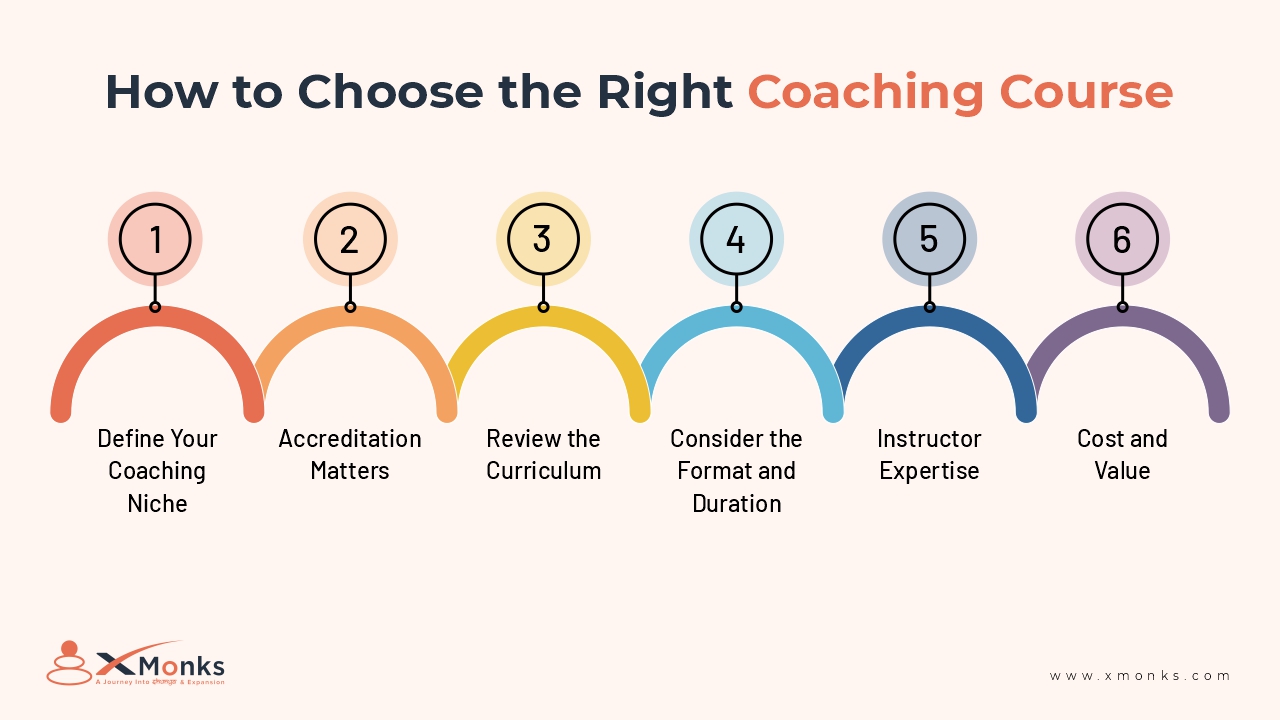
Choosing the right course from the many coaching courses available is a crucial step in your journey to becoming an effective coach. With so many options available, it’s essential to select a course that aligns with your goals, learning style, and career aspirations.
Define Your Coaching Niche
The first step in choosing a coaching course is to identify your area of interest or specialisation. Whether it’s life coaching, executive coaching, or health and wellness coaching, selecting a niche will help you narrow down your options to courses that focus on your desired field.
Accreditation Matters
Ensure the course you choose is accredited by a recognised organisation, such as the International Coaching Federation (ICF). ICF courses are all the rage in the market today. Accreditation ensures that the course meets industry standards and that your certification will be respected by clients and employers.
Review the Curriculum
Take a close look at the course content. A comprehensive curriculum should cover essential coaching competencies, including active listening, goal-setting, and ethical practices. Make sure the course also offers practical, hands-on experience to apply what you’ve learned.
Consider the Format and Duration
Coaching courses come in various formats, including online, in-person, and hybrid options. Choose a format that fits your learning style and schedule. Additionally, consider the course duration—whether it’s a short-term workshop or a longer, more intensive program.
Instructor Expertise
Research the qualifications and experience of the instructors. Experienced coaches with a strong background in the field can provide valuable insights and mentorship, enhancing your learning experience.
Cost and Value
Finally, evaluate the cost of the course in relation to the value it offers. While it’s important to stay within your budget, remember that investing in a high-quality course can pay off in the long run by boosting your career prospects.
By carefully considering these factors, you can choose a coaching course that not only meets your needs but also sets you up for success in your coaching career.
The Future of Coaching Courses
The coaching industry has experienced tremendous growth over the past decade, and coaching courses have evolved in tandem. As the demand for coaching continues to rise, the future of coaching courses looks promising, with several key trends likely to shape the landscape.
Increased Focus on Specialisation
As coaching becomes more mainstream, there is a growing demand for specialised coaching skills. In the future, coaching courses will likely offer more niche-focused programs, such as digital wellness coaching, leadership coaching for remote teams, or coaching for sustainability. These specialised courses (read ICF courses) will allow coaches to cater to specific market needs and differentiate themselves in a competitive industry.
Integration of Technology
Technology is set to play an increasingly significant role in coaching courses. The future will likely see the rise of AI-powered coaching tools, virtual reality (VR) simulations, and online platforms that offer immersive learning experiences. These technologies will enhance the accessibility and effectiveness of coaching education, allowing coaches to practise their skills in virtual environments and receive real-time feedback.
Emphasis on Ethical and Inclusive Coaching
With growing awareness around social justice and inclusion, future coaching courses are expected to place greater emphasis on ethical and inclusive coaching practices. This will include training on cultural competence, bias awareness, and ethical decision-making. Courses will likely incorporate case studies and scenarios that reflect diverse client backgrounds and challenges, preparing coaches to work effectively in a globalised and multicultural world. ICF courses already work hard to live the principle of diversity and inclusion on a daily basis.
Lifelong Learning and Continuous Development
The future of coaching courses will prioritise lifelong learning. As the coaching industry evolves, coaches will need to continuously update their skills and knowledge. Future courses will likely offer modular, ongoing education that allows coaches to stay current with industry trends, new coaching methodologies, and emerging best practices.
Global Collaboration and Standardisation
As coaching continues to grow globally, there may be a push towards greater standardisation of coaching education and certification. Organisations like the International Coaching Federation (ICF) will likely play a key role in this, working to ensure that coaching standards are consistent worldwide. This global collaboration will help maintain the integrity of the coaching profession and ensure that clients receive high-quality coaching services, regardless of location.
Accessibility and Affordability
As demand for coaching increases, there will be a push to make coaching courses more accessible and affordable. Future courses may offer more flexible payment options, scholarships, and financial aid to make high-quality coaching education available to a broader audience.
In summary, the future of coaching courses will be shaped by specialisation, technology, ethics, lifelong learning, global collaboration, and increased accessibility. These trends will ensure that coaching remains a dynamic and impactful profession, capable of meeting the diverse needs of clients around the world.
Conclusion
Choosing the right coaching course is a pivotal step in your coaching career. Whether you opt for an ICF-accredited program or another reputable course, investing in high-quality training will enhance your skills, increase your credibility, and set you on the path to success. By understanding the differences between various coaching programs and evaluating your goals and needs, you can make an informed decision and embark on a fulfilling coaching journey.
